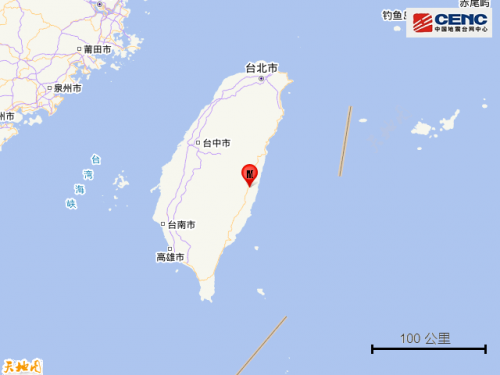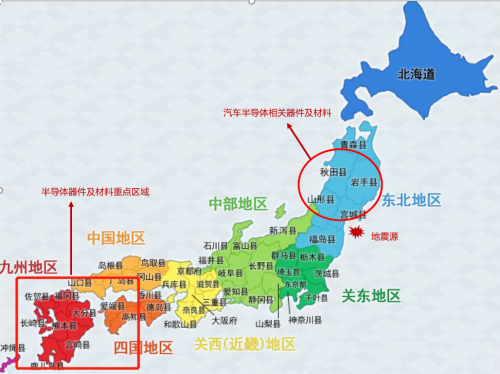发布时间: 2022/03/24 关注度: 727
The impact of the 323rd earthquake in Taiwan, China on the semiconductor industry chain:
In general, the impact of the earthquake on Taiwan's wafer fabs is limited, and it is roughly estimated that the capacity will be affected by about 0.5 days. TSMC / UMC will improve production efficiency in the later stage to eliminate this impact.
1. TSMC/UMC's factory in Hsinchu Science Park, Taiwan is operating normally. Only the central and southern Taiwan fabs saw short production stoppages.
2. According to the survey, TSMC Fab14/15/18 and UMC Fab12A had less impact on the evening of March 23. And since the morning of March 24, the factory has begun to resume normal production.
3. According to our survey, the impact of a factory shutdown is about 0.5 days, which can be eliminated by improving production efficiency in the later stage. Considering the characteristics of weak demand and high fab inventory, the impact of this event on semiconductor supply is limited.
The impact of the Fukushima 316 earthquake on the semiconductor industry chain:
According to the current situation, the earthquake mainly has a certain impact on the core enterprises of the automobile industry chain. It is understood that Murata, Toyota, and other companies will resume production after March 18, and the time for re-adjustment is expected to delay the supply of capacity for about a week.
The impact of the Fukushima 316 earthquake on the mobile phone industry chain:
1. The wafer and photoresist factories of Shin-Etsu and SUMCO are located in the earthquake zone. If they are affected by the earthquake, it may cause production problems for wafer foundries. The indirect impact will include the supply of the display drive ICs and CMOS image sensors (CIS).
At present, Shenggao has publicly stated that it has not been affected. Shin-Etsu also restarted production on March 17, which was equivalent to a two-day delay in production. Most of the silicon wafer supply of Taiwan fabs TSMC and UMC mainly come from Universal Crystal (no impact this time). Therefore, the impact of the disaster-hit silicon wafer and photoresist capacity supply in northeastern Japan on display drive ICs and CMOS image sensors (CIS) is very limited.
2. The UMC (Japan) fab was not affected by the earthquake. Wafer foundry UMC pointed out that the production and operation of UMC's Japanese subsidiary Fab12M were not affected by the earthquake.
3. Sony Semiconductor's image sensor business was little affected, and mobile phone image sensors were not affected. On March 17, Sony stated that due to the strong earthquake in Fukushima, the company's three factories were suspended, namely the CMOS image sensor factory in Tsuruoka City, Yamagata Prefecture, the storage media factory in Taga City, Miyagi Prefecture, and the Miyagi City. A laser diode factory in Shiroishi, Chengxian. Production has resumed.
4. Taiyo Yuden was unaffected by the earthquake. As a major Japanese multi-layer ceramic capacitor (MLCC) maker, Taiyo Yuden said on the 17th that the Fukushima earthquake did not cause much damage to the plant and equipment of the company's group's production base, and production was not affected.
The impact of the Russia-Ukraine conflict on the semiconductor industry chain:
In general, each fab has inventory and some long-term cooperation guarantees for the inert gases used. The shelf life is about 2-3 years, and there is still a long-term supply in other regions. Therefore, we do not expect an impact in the short term. However, panic purchasing and rising transportation and logistics costs will lead to an increase in chip production costs. If there is another emergency, it will directly lead to a rise in chip prices.
Detailed analysis:
1. According to SEMI, Ukraine supplies 70% of the global demand for neon, 40% of krypton, and 30% of xenon. The Russian-Ukrainian conflict will impact the supply of inert gas in the region, and the reduction in gas supply will cause prices to rise and chip production costs to rise. The cost of electronic gas accounts for 5%-6% of the total cost of IC materials, which is not a large proportion but largely determines the performance of semiconductor devices. However, the relevant fabs are ready for long-term demand. Manufacturers such as TSMC, Samsung, and GF said that the conflict between Russia and Ukraine has no direct impact on chip production due to sufficient material inventory or benefiting from the diversified supply of materials. At the same time, the total demand for electronic gases such as neon is not large, and their price fluctuations will not have a particularly significant impact on wafer manufacturing costs.
2. On February 22, the lithography machine company ASML said that due to the situation in Ukraine, ASML is looking for other sources for the small amount of neon gas used in the factory. Less than 20% of ASML's neon gas feedstock comes from the country.
3. According to Yonhap News Agency’s report on February 24, SK Hynix stated that the Russian-Ukrainian crisis has no direct impact on their chip production, and the company has sufficient (raw material) inventories.
4. On February 15th, Micron issued a "statement on the supply of noble gases" on its official website, saying that all its noble gases have diversified procurement, and the supply of neon gas is mainly from different suppliers in the EU, the United States, and Asia, and Maintain an appropriate stock of inert gas.
5. Russia is an important producer of metals such as aluminum, nickel, and copper. Aluminum metal is commonly used to make passive components and wire bonds. Passive components, such as resistors and capacitors, are commonly used in all types of electronic equipment. Supply disruptions for any of these metals could lead to higher prices, which in turn affect the prices of semiconductor equipment and electronic systems. According to the survey, some manufacturers of head resistors and capacitors currently have high inventories and diversified supply chains, which will not be affected in the short term.
关于中国台湾地区323日地震对于半导体产业链的影响:
总的来说,地震对于台湾地区晶圆厂的影响是有限的,粗略估计约影响0.5天产能。 台积电/联电后期将会提升生产效率来消除此次影响。
1,台积电/联电在台湾新竹科学园区的厂区运营正常。 仅台湾中部和南部晶圆厂出现短暂停产。
2,根据调研,台积电 Fab14/15/18 和联电 Fab12A 在3月23日晚上的影响较小。且从3月24日早上开始,厂区又已经开始恢复正常生产了。
3,根据我们的调查,工厂停工的影响大约为 0.5 天,他们可以在后期提高生产效率来消除此次的影响。考虑到需求疲软及晶圆厂高库存的特性。因此,对半导体供应的影响有限。
关于日本福岛316地震对于半导体产业链的影响:
根据目前现状来看,此次地震主要是对于汽车产业链的核心企业产生一定的影响。据了解,例如村田及丰田等企业在3月18日后开始恢复生产,加上重新调机的时间,预计将会延误一周左右的产能供应。
对于手机产业链的影响分析如下:
1,信越化学(Shin-Etsu)和胜高(SUMCO)的硅片(wafer)及光刻胶工厂处于震区,若受到地震影响或将导致晶圆代工企业生产问题,间接影响包括面板驱动芯片及图像传感器 (CIS)在内的半导体供应。
目前胜高已经公开表示未受到影响。信越在3月17号也重启生产,相当于耽误2天的产量。并且台湾晶圆厂台积电和联电大部分硅晶圆供应主要来源于环球晶(此次无影响)。因此,日本东北部受灾的硅晶圆及光刻胶产能供应对于面板驱动芯片及图像传感器 (CIS)产生的影响非常有限。
2,联电(日本)晶圆厂,未受到地震影响。晶圆代工厂联电指出,联电日本子公司Fab12M生产营运,则未受到地震影响。
3,索尼半导体的图像传感器业务影响甚微,尤其是手机类图像传感器无影响。3月17日,Sony表示受福岛强震影响、导致该公司3座工厂进行停工,分别为位于山形县鹤岗市的CMOS图像传感器工厂、位于宫城县多贺城市的储存媒体工厂和位于宫城县白石市的激光二极管工厂。目前Sony停工厂基本已经恢复生产。
4,太阳诱电(Taiyo Yuden),未受到地震影响。日本积层陶瓷电容(MLCC)大厂太阳诱电(Taiyo Yuden)17日表示,福岛强震对该公司集团生产据点的厂房、设备未造成太大损害,生产未受影响。
关于俄乌冲突对于半导体产业链的影响:
总体来看,各晶圆厂对于所用惰性气体都备有一定的库存及一些长约合作保证供应,保质期在2-3年左右,且仍有其它地区长约供应的情况下。因此,我们预计短期内不会立即产生影响。但是,恐慌性购买以及运输和物流成本的上涨将会导致芯片生产成本上升,如再遇到相关突然状况,将会直接体现在芯片涨价。
详细分析如下:
1,根据国际半导体产业协会(SEMI)资料显示,乌克兰供应了全球70%的氖气的需求,氪气的40%以及氙气的30%。 俄乌冲突将会冲击该地区惰性气体供应,气体供应量减少将造成价格上涨,晶片生产成本上涨。 电子气体成本占IC材料总成本的5%-6%,占比并不大,但是很大程度上决定了半导体器件性能的好坏。但是,相关晶圆厂已做好应对长期需求的准备。台积电、三星和格芯等厂商表示,由于材料库存较为充足或受益于材料多元化供应,俄乌冲突对芯片生产无直接影响。同时,氖气等电子气体总需求量不大,其价格波动不会对晶圆制造成本产生特别明显的影响。
2, 2月22日,光刻机公司ASML表示受乌克兰局势影响,ASML公司正在为工厂使用的少量氖气寻找其他来源。ASML公司有不到20%的氖气原料来自该国。
3,据韩联社2月24日报道,SK海力士方面表示,俄乌危机对他们的芯片生产没有直接的影响,公司有足够的(原材料)库存。
4,2月15日,美光在官网发布“关于惰性气体供应的声明”,称其所有的惰性气体都有多样化的采购,氖气的供应主要来自欧盟、美国和亚洲不同的供应商,并且保持有适当的惰性气体库存。
5,俄罗斯是铝、镍和铜等金属的重要生产国。铝金属通常用于制造无源元件和引线键合。无源元件,例如电阻器和电容器,通常用于所有类型的电子设备。任何这些金属的供应中断都可能导致价格上涨,进而影响半导体设备和电子系统的价格。根据调研,目前一些头部电阻器和电容器厂商都备有高库存且供应链多样化,短期内暂无影响。
中文:
俄乌冲突及地震等突发事件对于半导体产业链的影响分析


提交右侧信息,了解更多会员服务方案;
或直接联系我们:
+86 151-0168-2530